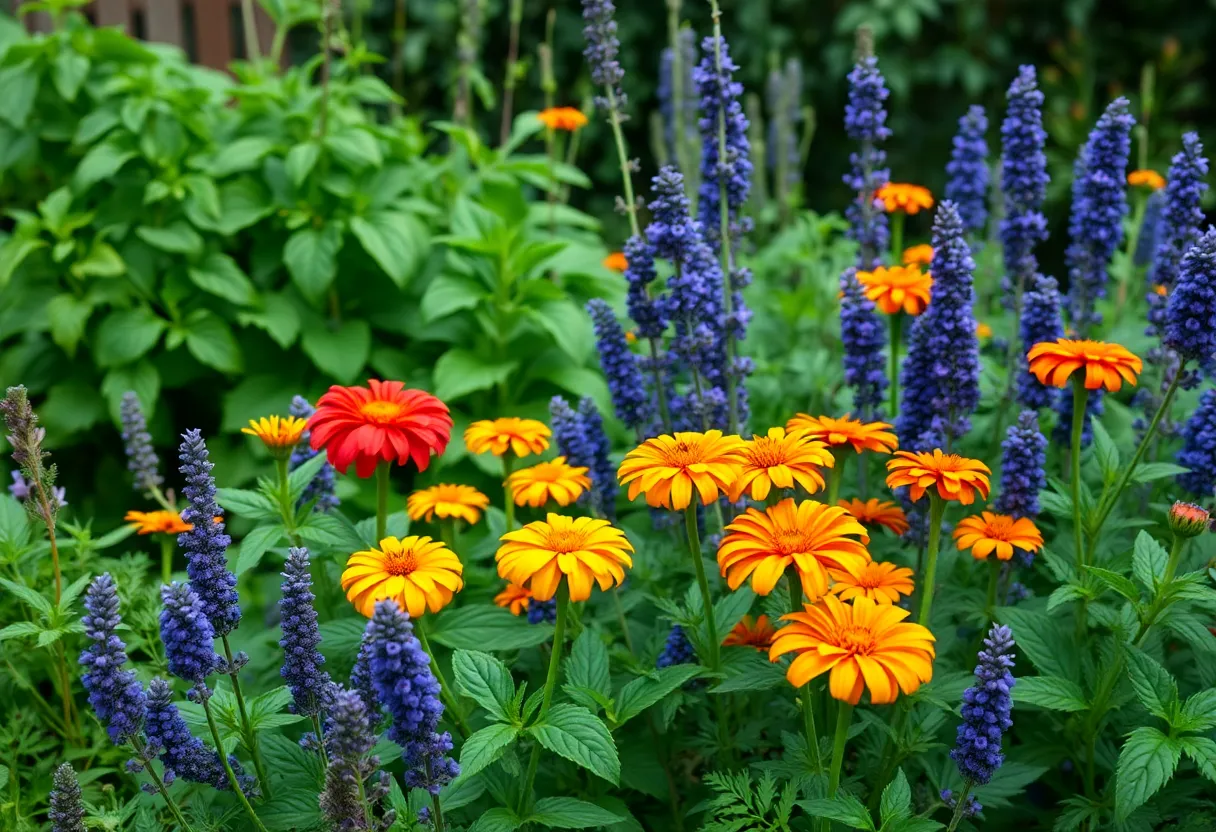Creating a pest-resistant garden oasis in Houston’s humid climate
Introduction
Designing a garden that resists pests in Houston’s humid climate requires strategic planning. The region’s high humidity and warmth foster an environment where pests thrive. To combat this, gardeners must select suitable plants, adopt effective planting practices, and employ natural pest control measures. This comprehensive guide offers proven strategies to build a thriving, pest-resistant garden tailored to Houston’s unique climate.
Understanding Houston’s Humid Climate
Houston’s climate features consistently high humidity coupled with warm temperatures year-round. This creates an ideal environment for insects such as aphids, mosquitos, whiteflies, and beetles to flourish. Moisture diffuses plant defenses, making them more susceptible to pest invasions. Elevated temperatures accelerate pest life cycles, leading to rapid infestations. Consequently, pest prevention must be proactive, focusing on the environment’s particular conditions to minimize vulnerability.
Key factors include:
- Persistent moisture levels supporting fungal growth and pest breeding grounds.
- Warm temperatures encouraging rapid pest development.
- Limited natural predators due to ecological imbalances caused by the climate.
To address these, selecting resilient plants and implementing habitat modifications are vital steps.
Choosing Pest-Resistant Plants
Incorporating pest-resistant plants is the cornerstone of an effective pest control strategy. These plants possess traits such as thick foliage, aromatic properties, or natural chemical defenses that deter common pests in Houston’s climate.
Top Pest-Resistant Plant Selections
| Plant | pests repelled or deterred |
|---|---|
| Basil | Aphids, flies, mosquitoes |
| Lavender | Moths, fleas, flies, mosquitoes |
| Marigolds | Whiteflies, nematodes |
| Mint | Ants, fleas, aphids, mosquitoes |
| Rosemary | Cabbage loopers, carrot flies, mosquitoes |
| Thyme | Cabbage loopers, whiteflies, maggots |
| Lemongrass | Mosquitoes |
| Nasturtiums | Squash bugs, aphids, beetles |
| Peppermint | Aphids, beetles, whiteflies |
| Mexican Marigold | Insects and rabbits |
| Radish | Cabbage maggots, cucumber beetles |
These plants contain volatile oils and strong scents that confuse, repel, or discourage pests, reducing infestation risks naturally.
Strategic Plant Placement: Companion Planting
Companion planting involves situating complementary plants together to achieve pest deterrence, improved pollination, and optimized space utilization. This method can disrupt pests’ ability to locate their preferred crops and attract beneficial insects that prey on pests.
Effective Companion Planting Techniques
- Basil near tomatoes: Repels aphids and reduces pest pressure on tomatoes.
- Mint around brassicas and beans: Deters ants and beetles without allowing mint to invade other areas.
- Nasturtiums as trap crops: Draw pests like squash bugs and aphids away from main crops, sacrificing the nasturtiums to protect your primary plants.
- Marigolds throughout the garden: Deterrents to nematodes and soil-borne pests.
This approach leverages chemical signaling by plants, suppressing pest attraction and fostering healthier, more resilient crops.
Natural Pest Control Methods
Employing natural remedies offers a chemical-free means to manage pests while safeguarding beneficial insects and the ecosystem.
Effective Natural Sprays and Techniques
Cream of Tartar Spray
Mix two tablespoons of cream of tartar with a cup of water. Spray directly on affected leaves, especially targeting aphids to disrupt their feeding patterns. Repeat as necessary.
Tomato Foliage Spray
Chop tomato leaves and soak in cool water for 24 hours. Strain and spray on infested plants. The compounds in tomato leaves deter aphids and other soft-bodied pests.
White Oil Spray
Combine vegetable oil with a few drops of liquid dish soap. Apply this mixture to suffocate pests like aphids and mealybugs. Cover both sides of affected leaves for comprehensive coverage.
Encouraging Beneficial Insects
Plant nectar-rich flowers like dill, fennel, and cosmos to attract ladybugs, lacewings, and parasitic wasps. These natural predators control pest populations effectively, reducing reliance on chemical interventions.
Garden Maintenance for Pest Prevention
Consistent maintenance practices dramatically influence pest management success.
Regular Monitoring
Inspect plants weekly for pest signs—like chewed leaves, sticky residues, or visible insects. Early detection prevents large-scale infestations.
Pruning
Remove dead, diseased, or infested foliage promptly. Proper pruning improves airflow and diminishes pest habitats.
Water Management
Maintain proper watering schedules. Overwatering fosters fungal growth and attracts pests seeking moist environments.
Mulching
Apply a layer of mulch to conserve moisture and suppress weeds. Use clean, pest-free mulch to prevent introducing pests from outside sources.
Additional Ecosystem Strategies
Habitat Modification
Eliminate standing water, debris, or dense ground cover that serve as breeding grounds for pests. Creating a balanced environment supports beneficial insects naturally.
Crop Rotation and Diversity
Rotating crops each season and cultivating diverse plantings prevent pest populations from establishing secondary habitats and reduce disease spread.
Conclusion
Developing a pest-resistant garden oasis in Houston requires thoughtful plant selection, strategic planting techniques, and natural pest management practices. Prioritizing plants with inherent pest deterrence, implementing companion planting, and maintaining vigilant garden routines build resilience against pests. By integrating ecological principles and native plant advantages, gardeners can enjoy a healthy, vibrant garden tailored to Houston’s humid environment—sustainable, productive, and minimally chemical-dependent.
Frequently Asked Questions
How can I naturally repel mosquitoes in my Houston garden?
Plant mosquito-repelling plants such as lemongrass, citronella, lemon balm, and marigolds. Use strategic water management to eliminate standing water. Installing mosquito screens or using fans can also reduce mosquito presence.
What are the best plants for pest prevention in Houston’s humidity?
Plants like basil, lavender, marigolds, mint, rosemary, thyme, and nasturtiums are highly effective at deterring pests due to their aromatic properties and natural defenses. Incorporating these ensures a more pest-resilient garden.
Are companion planting methods effective in Houston’s climate?
Yes. Strategic companion planting can reduce pest invasions by confusing pests, acting as trap crops, and attracting beneficial insects. This technique is especially effective when tailored to Houston’s humid environment.
What natural sprays can I use to control pests without chemicals?
Use homemade sprays like tomato foliage extract, white oil, or cream of tartar solutions. Encouraging beneficial insects is also a highly effective, chemical-free method.
Key Features of a Pest-Resistant Garden in Houston
| Feature | Description |
|---|---|
| Climate Adaptation | Choosing plants suited for high humidity and warmth, enhancing resilience. |
| Natural Pest Deterrents | Inclusion of aromatic and chemically resistant plants like lavender and marigolds. |
| Companion Planting | Strategic plant combinations that repel pests and promote pollination. |
| Ecological Balance | Encouraging beneficial insect populations for natural pest control. |
| Continuous Maintenance | Regular inspection, pruning, and habitat management to prevent infestations. |
| Minimal Chemical Use | Preference for organic and homemade solutions to minimize environmental impact. |
Author: STAFF HERE HOUSTON TX WRITER
The HOUSTON STAFF WRITER represents the experienced team at HEREHouston.com, your go-to source for actionable local news and information in Houston, Harris County, and beyond. Specializing in "news you can use," we cover essential topics like product reviews for personal and business needs, local business directories, politics, real estate trends, neighborhood insights, and state news affecting the area—with deep expertise drawn from years of dedicated reporting and strong community input, including local press releases and business updates. We deliver top reporting on high-value events such as Houston Livestock Show and Rodeo, Art Car Parade, and Chevron Houston Marathon. Our coverage extends to key organizations like the Greater Houston Partnership and Houston Area Urban League, plus leading businesses in energy and healthcare that power the local economy such as ExxonMobil, Schlumberger, and Houston Methodist. As part of the broader HERE network, including HEREAustinTX.com, HERECollegeStation.com, HEREDallas.com, and HERESanAntonio.com, we provide comprehensive, credible insights into Texas's dynamic landscape.





